The characters in "Hamlet" in search of oneself
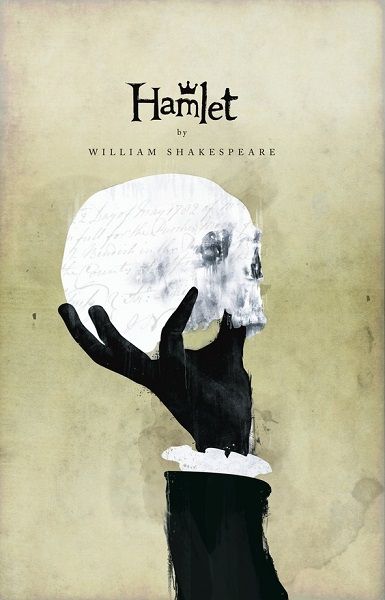
The genius playwright and philosopher William Shakespeare writes Hamlet - his greatest work in 1601, at the very beginning of the 17th century, the century of change not so much in world history as in the human perception of the world in the mentality of the European. The tragedy is the old legacy of the 12th century about the Danish prince Amlet and his revenge. The real prince lived, acted and died in classical medieval laws. He learns that his father is murdered, he thinks of vengeance, puts him into action (he ignites the palace, without thinking much about the perpetrators of the innocent souls), himself dying in battle. Renaissance changes human methods of perception and analysis of the world. A typical hero of the new era is Shakespeare's Prince Hamlet. While for the medieval man the suspicion is unknown - he believes in certain doctrines and not only does not question them but does not discuss them, he strictly complies with the principles of his nature as needs, passions, desires, lives for the moment and the day - he can question, ask, seek, change with the changing reality. Hamlet is a tragedy not for a particular person in a certain historical period, but for the eternal problems of the intelligent man, the eternal questions facing the waking person, the choice between what is necessary and desirable. The main problems in the tragedy stand before Prince Hamlet, they want his intervention, his solution, but he is alone, though a person of another time - more advanced, humane and intelligent. Claudius, Gertrude, Laerte, Horatio, Fortrobras, Rosencrantz and Guilden, soldiers, guards, graveyards have chosen their way into life, their way of life, and follow it as their beliefs command. Each of them seeks a place in life, its philosophy, its own corner in reality. At first glance, the main conflict is between Prince Hamlet and King Claudius. But this is just an external conflict. In fact, Hamlet is in a dispute with all the heroes, striving to prove their correctness - both in the collision of the crown, in the life, and in the philosophy of life. Claudius is a typical medieval man. He had a passion and achieved it. The second son in the family, Claudius sees and understands that everything - honor, glory, future - is for the elder brother, his throne, his good Gertrude. Claudius seeks to achieve what his brother has received under the laws of the forebod and succeeds. With cunning, cunning, unbeatable fornication, he eliminates the opponent and achieves his goal. When he senses that Prince Hamlet knows of his crime, Claudius understands that he can easily remove it. But he begins a game - unnecessary, dangerous, inconsistent with his mentality: to get everything fast, secure and safe. Claudius is tired, he does not have more goals in his life, he does not aim for anything more, and so he plays the game gaily, without distraction, even with a certain contemplation - how far Hamlet can find in his revelations.
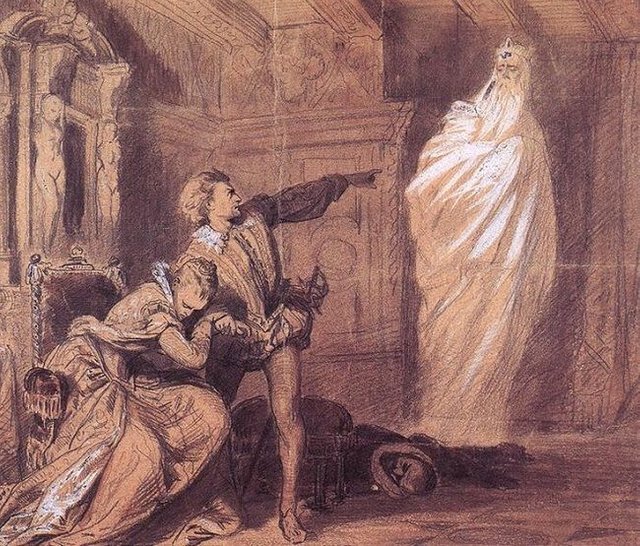
In his monologue at the meeting with courtiers and Hamlet (second scene, first action), the King stressed the need to obey fate, death and god, preaching in the typical medieval spirit of obedience and resentment. Against this theory the rebellious prince stands up in his famous monologue ("Being or not ...") and rejects the obedience to whom and whatever. Claudius preaches in a special "immutableness" of life, inertia in thinking and being contradicting of the Renaissance thinking of change, of seeking the new in man and in the world. Even when he directs Laerte against Hamlet, the king is somewhat inert. Laerte is much more active than him, offers ways of destroying the enemy, is ready to sacrifice everything for the sake of his goal. Claudius becomes more active and treacherous when he sees his plans for failure - in the fight scene. It is too late and he loses not because he is weaker, but because he has left his own theory of inertia. Claudius is a typical medieval ruler - cunning, clever, subtle - when necessary, good and flattering - when needed. His contradictions with Hamlet are mostly in the philosophy of life. Claudius strives for what he considers necessary for himself, and then seeks some justification (prayer), while Hamlet - as a typical Renaissance thinker - refines the world and reality in summary, from the point of view of human thought, from the position of the eminent philosopher . In some moments, Hamlet is extremely active (Polonia's death, the counteraction of his treacherous death in England, the duel), while most of the time he judges his actions in terms of abstract goodness, not as part of the self-centered use of realities. Claudius is also a representative of the new phenomenon of hypocrisy, the hypocritical puritanism, the quest to conceal selfishness with the double-mindedness of man and the world, and the search for justification for its own moral disabilities outside of itself - in history, in time, in unjust, it, laws. There is no instantaneous dissatisfaction with Claudius' royal power in the play. Courts, guards, warriors compare him to his dead brother, but the gladness of his rule is evident. For ordinary people, the momentary tranquility, the comforts of today's day are the inconvenience of clashing with an outside enemy, an unfamiliar philosophy, something new and changing the familiar reality. That is why Claudius is a good ruler, responding to time and manners. But to the laws of eternal morality, to the requirements of the history of searching for new roads, to the responsibilities of the leader for a change of life, Claudius recedes. The crime that led him to power he seeks to forget. Hamlet is the one who constantly reminds him of the true state of affairs - who is the legal ruler, who is second not only to the law of the birthright but also to the law of man - the better is a leader. And in a third act, the king feels this. Then an internal struggle begins there - between the fear of relinquishing the dignity of the ruler. Yes, Claudius has acquired this spiritual quality - a ruler's dignity. To trace the content and meaning of his first words to the audience:
Though yet of Hamlet our dear brother’s death
The memory be green, and that it us befitted
To bear our hearts in grief and our whole kingdom
To be contracted in one brow of woe,
Yet so far hath discretion fought with nature
That we with wisest sorrow think on him
Together with remembrance of ourselves.
Strictly, he mumbled, he uttered the words of brotherly pity and state responsibility, twice mentioning his brother, and only at the end of the expression - himself. From this position, the marriage to Gertrude - a violation of Christian law - appears to be a law and even a sacrifice in the name of statehood, and the swiftness of acts - required by time and reality. The king is influential, even his nephew falls under his influence - for a long time Hamlet can not perceive him as a murderer.
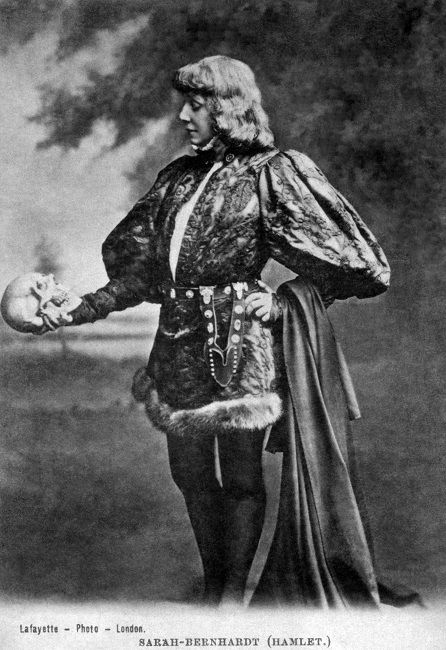
The king is different in the stage of prayer. He wants forgiveness from heaven, but he does not acknowledge his guilt, but seeks understanding, justification for what he has done. In the scene of the Claudius fight, it is getting stronger. As a beast pressed in the corner, he laughed at Laerte, trying to defeat both Hamlet and Gertrude, for the last time attempting to restore the status quo and quiet life. Earthly, material have conquered the soul of the end, he succumbed to desire and passion, no power to rise above the weekly, to understand himself even. So he perishes - he did not understand that he himself was destroyed, that he was punished not only by the laws of the earth, but also by the eternal human and divine rules of morality.
And so, Laert dies, has managed to find a way to himself, to penetrate the wall, to find out why his earthly path has been abandoned, and so to accept the justice of his destiny by repentance. Laerte. and Hamlet are very close - as suffering people (both have lost their fathers), as young scientists (both students, humanists, philosophers), by age and place of life. But while Hamlet puts a total human dimension to his tragedy and seeks righteousness for all, Laerte obeys self-esteem, even avoiding the question of why his father was murdered, seeking salvation from the mental disturbance and disturbed life equilibrium in finding a suitable enemy and ways to eliminate it . Laerte forgets the environment in which he had lived and developed until recently. Returning to Denmark, he obeys the laws of everyday life, hiding behind the strange guilt, becomes more subtle than his leader in the world of evil. When Claudius prepares him for the fight, Laerte himself suggests using a poisonous blade. He does not excite himself from the eternal, from the common, but seeks his way into reality. When Hamlet learns of his father's death, he takes it as a fact and begins to look for the answer to the question - "why? ". Why does a brother kill a brother, why does a man kill the man, what makes people sink over his neighbor? And Laerte does not come to these eternal problems. He is excited by the present - "who"? No why? "And" who kills his father ", not" why? "And" who "is to blame for his sister's death. And in the style of his materialistic perception of the world, he finds his way into reality. Laerte fails to overcome the Medieval perception of reality as being circumscribed, subordinate to the passing and weekly, to reach Hamleton's understanding of the world as a collection of people, personalities, thinkers, and creators of the good god creatures responsible for themselves before others, before God. Laerte's path to sufficiency is a path in matter, a path to matter, a satisfying self-centered desire, and own issues that go only to his "ego".
Laerte understands what a Renaissance man needs, theoretically at the level of Hamlet. Here are his wise words:
So mortal that, but dip a knife in it,
Where it draws blood no cataplasm so rare,
Collected from all simples that have virtue
And here is the other Laerte, who obeyed the passion to avenge, ready to entrust his soul to the devil:
Under the moon, can save the thing from death
That is but scratched withal. I’ll touch my point
With this contagion, that if I gall him slightly
It may be death.
Thus, the proud Laerte, building the "inner service of spirit and mind", descended to the primal, himself becomes an object, in a "cannon" striving to fulfill his duty of vindictor, becomes a victim of foreign corns.
An original antitype of the two is the Norwegian Prince Fortinbras. Guided by the thought of regaining the land lost by his father, he collected an army for war with Denmark. Called by his uncle - the king, Fortrobras accepts (frankly or not) his advice and leaves the thought of avenging the father's defeat. Fortonbras managed to temporarily abandon his plans, redirect his energy and efforts (again temporarily), wait for the events to develop and become the winner of the unsettled war. He does not want to break his pride and become someone's weapon, but he does not succeed in raising himself over the dominating state of dissatisfaction with the past. That's why those Hamlet words are in recognition of the superiority of the tragedy:
Four Captains
to move to the upper playground
the corpse of Hamlet as a corpse of a warrior,
because he would be a worthy king
of Denmark.
And this admiration is psychologically understandable. Fortrobras is a true warrior and master, he manages to achieve the thought, to avenge and defeat. But the Prince understands that he lacks the philosophy of Hamlet, his wide-cut look at the world and things, his sense of the new, his ability to rise above the earth dust to the stars. Fortunbras' admiration to Hamlet proves two things - the greatness of the Hamlet spirit conceived by his contemporaries, and the power of the Norwegian prince to see realistically the world, the correctness of his chosen path to himself.
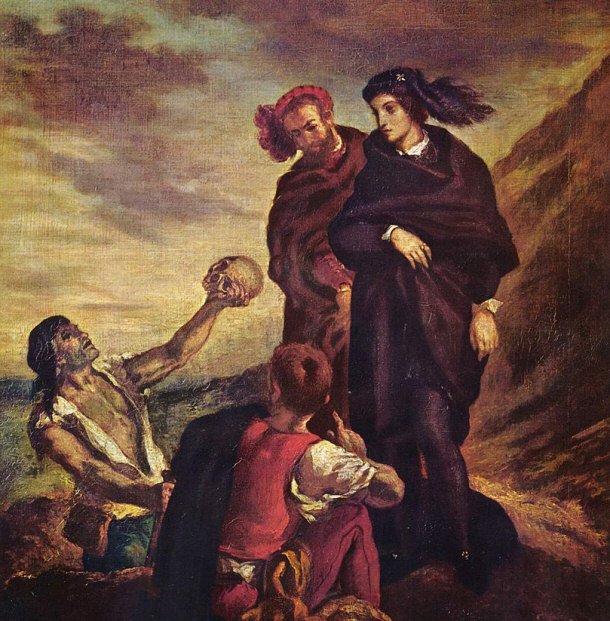
Rosencrantz and Gildenstern are Dead
Another time in their lives they choose Rosencrantz and Gildenstern. Former friends of Prince Hamlet are super-thinking, with the great self-confidence of the limited people. For them, the world ends where their interests end, so their choice is wrong - both philosophical and life-like. They are betting on the realities of Claudius' victory. He is the ruler at the moment, he is the future, they think. And they lose because they can not look in perspective - even from an egoistic point of view. Their elementary character is quintessential. They try to serve Claudius, but so blatantly, so frankly, "check" the condition of their ex-boyfriend that they manage to set him up against himself. That's why Hamlet does not regret their destruction, does not feel remorse of conscience that he sent them to death. Guildenstern and Rosenkrantz have remained in his past, where innocence, children's games, where everything was nonsense, was invalid. And now is a cruel and real reality, a time of choice. That's why they are rightfully taken away by the swirl of the rapidly changing reality. Rosencrantz and Guildenstein are the winners of the palate's qualities - servility to power and power, weakness to the master, loyalty to the state-runner. To them, Claudius is the state, the power, the present, and the future. Right or wrong - he is the king, and they - his faithful servants. Having chosen this time in their lives, they quickly reach its end, eliminated as unnecessary barriers between the two poles - Hamlet and Claudius. With more experience, with more self-confidence, they would be able to prevail over the Prince's caution, for Hamlet is alone, Horatio is his only support, and the advent of comrades from childhood is a kind of spiritual support for the prince. But they are in a hurry to gain a good position in front of the king, to expose his ex-madman's madness, to sacrifice him on the altar of selfishness. So no one regrets their destruction - neither Hamlet, nor Claudius, nor the reader.
Horatio is perhaps the most controversial image in the tragedy. He is a friend of Hamlet, the prince devotes his words:
As one in suffering all that suffers nothing—
A man that Fortune’s buffets and rewards
Hast ta'en with equal thanks. And blessed are those
Whose blood and judgment are so well commingled,
That they are not a pipe for Fortune’s finger
To sound what stop she please. Give me that man
That is not passion’s slave, and I will wear him
In my heart’s core, ay, in my heart of heart
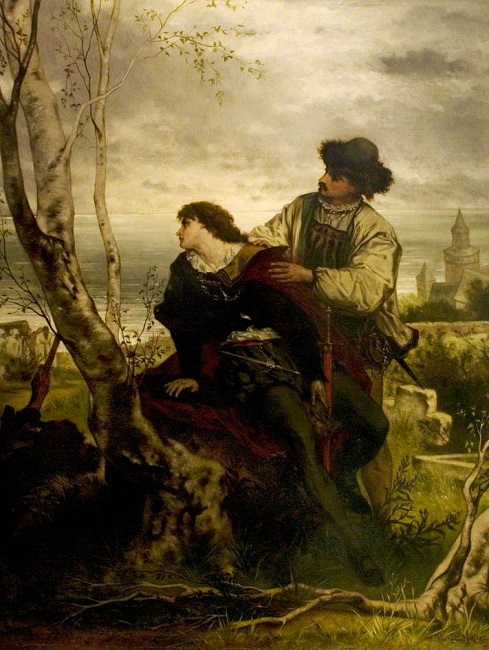
'Hamlet', Act V, Scene 2, Hamlet and Horatio
Horatio is the only free person in the tragedy. He is not connected with relatives and acquaintances in the palace, he does not weigh the past and the relationships of childhood, the tragic history of Hamlet's father has reached his heart through the grief of his friend. Horatio chose Hamlet's path, chose to be second after him, chose to accept his opinion, deeds, thoughts unreservedly. And here is the great loss for Horatio the man. Horatio becomes such a pale shadow of the prince that he himself does not perceive him as a possible opponent. Hamlet's tragedy is that his only equal in dialogue and philosophy is he himself. Hamlet argued with Hamlet, Hamlet exposes his reflections and arguments to Hamlet, Hamlet is alone in front of a huge mirror. Horatio is idealized by the prince. In fact, he is quite pale as a hero, and as a person. Horatio is the contractor, not the friend. The prince does not share his excitement with him, he does not seek sympathy for the drama in the family, he does not ask for advice and help. Hamlet does not dedicate Horatio to his plans, so far. Horatio is confused with this, but he sees everything on the basis of trust. After Hamlet's death, he remained weightless - alone, without roots, without any prospect. For Fortranbras he would not play that role as a listener, returning to Wittenberg is pointless - the experience in Elsinor will leave a deep impression on the hero's psyche and worldview. Horatio is a type of "second self," a personality whose references to information about Hamlet's thinking and the intentions of other actors. Because Horatio is not dangerous to anyone - and Claudius and Polonia and Laert accept his presence as inevitable and normal, communicate with him, but they do not try to attract him to his cause. After Hamlet's death there was a weightlessness, detached from the world around him. While for the prince the king is clear as a person - a person, unhappy with what he has accomplished, a man with a lot of ambition, but without ammunition, his mother is unclear as a person, as a culprit or a criminal. Hamlet knows a Gertrude - the caring mother, the true wife, the honest queen. Meeting with the specter confuses his concepts. Now he is trying to figure out what Gertrude has had to the abyss of the vagina - she was once a queen loved by her husband. possessing both power and influence in the state. With her marriage to Claudius, she loses in one respect - it is not moral to marry so soon after her husband's death, even if this is justified by state interests. Gertruda turns out to be weak as a person, with a limited glance, with elementary views of the world and life. It was hard for her to live near her superior king, to see and understand every day her superiority - intellectual, personal, human. For her, Claudius is the better choice - he is a criminal that automatically falls out of a sort of human ranking. The union between Claudius and Gertrude is a union of shipwreckers who have a common purpose and interfere with each other. Gertruda - beautiful and charming, but sensual and passionate, feels overlooked by the former king. He was harsh as a man, both as a father and as a king, but with the typical sternness of the Middle Ages - hiding tenderness and kindness. Gertrude could not penetrate the former king's mask, and therefore sought out the outside - Claudius' tenderness and obedience, but manifestations concealing his true face - cruelty and self-love. Thus, typically in females, Gertruda chooses the outer, shiny, intended for others, and not the true, deeply human, reserved only for the chosen and beloved. This wrong way leads her to participate in the crime, and to the chosen death. She learns that she is preparing her son's murder, chooses him in front of the fake pet, drinks the cup with the poison. Gertrude could expose Claudius, but then she would be exposed as well, and the sly and experienced plotter could escape justice. So she chooses death-tells Hamlet the culprit, accepts the redemption through the poison. And one more thing - she pronounces the most cruel sentence on herself because she kills herself, and suicides are pre-convicted of suffering in hell.
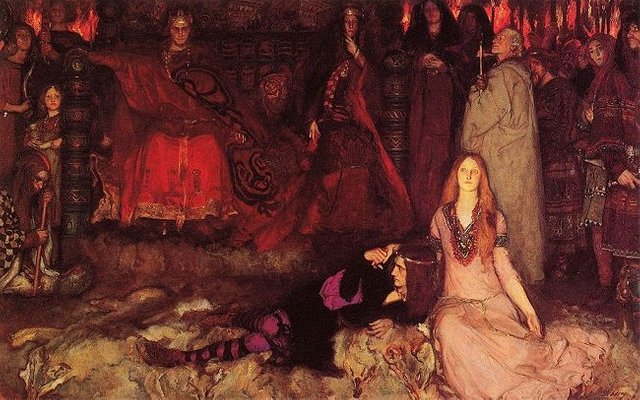
Hamlet reclines next to Ophelia
Ophelia is a young, beautiful girl who attracts Hamlet with her beauty and innocence. Soon he began to come out of it, for he had already been deceived by a woman-his mother, the woman he believed the most he loved and loved. Ophelia did not pass the test of the events. She has no spiritual power to defeat, and no intellectual ability to rise to the heights of the restless, seeking Hamlet spirit. That is why the prince treats her coldly, even cruelly. Having understood her death, he regrets her lost life, that he is also responsible for her ruin, for the missed opportunities to save her innocent soul. This death is also lawful, for Ophelia could not withstand the atmosphere in the palace, the atmosphere of intrigue, the wickedness, the deceit. Ophelia is the only innocent victim of Hamlet's play, the only one he regrets.
The Hamlet tragedy, typical of Elizabethan England, carries traits of later eras, but remains eternal and classic with its characters, their quests, their choice, the human-specific problem - what path in life to choose, what is good and what evil, how can you live beautifully and comfortably, when and what to accept sacrifices. The diversity of heroes and fates makes tragedy and a sort of gallery of types of all times and peoples, and interesting as a literary play - an intriguing, attractive, instructive, aesthetic, fine work of the great playwright William Shakespeare.